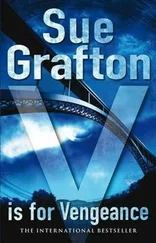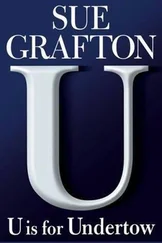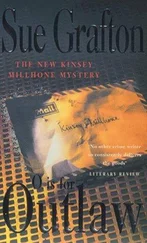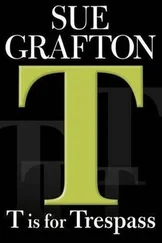"Rhe, don't be silly. I'd never suggest such a thing. I'm trying to disconfirm a report. That's all it is."
"What report?"
"Look, it's probably nothing and I'd rather not get into it. I can talk to Tippy later. I should have done that in the first place."
"Kinsey, if somebody's making some claim about my daughter, I'm entitled to know. Who said she was out? That's an outrageous accusation."
"Accusation? Wait a minute. It's hardly an accusation to say she was driving around in a pickup truck."
"Who told you such a thing?"
"Rhe, I'm really not at liberty to divulge my sources. I'm working for Lonnie Kingman and that information is privileged…" This was not true, but it sounded good. Lawyer-client privilege didn't extend to me and had nothing to do with any witnesses I might approach. I could hear her try to get a grip on her temper.
"I'd appreciate it if you'd tell me what's going on. I promise I won't ask about your sources, if that's really an issue."
I debated briefly and decided there was no reason to withhold the information itself. "Someone claims to have seen her out that night. I'm not saying it has any bearing on Isabelle's death, but it struck me as odd that she's never spoken up. I thought she might have mentioned something to you."
Rhe's tone was flat. "She's never spoken up because she wasn't out."
"Great. That's all I need to know."
"Even if she was, it's no business of yours."
I cupped a mental hand behind my mental ear. "'Even if she was' meaning what?" I said.
"Nothing. It's a turn of phrase."
"Would you ask her to call me?"
"I'm not going to ask her to call you!"
"Do what you like, Rhe. I'm sorry for the interruption." I banged down the receiver, feeling my face suffuse with heat. What was her problem? I made a note about a subpoena for Tippy Parsons if there wasn't one already. I hadn't attached that much credence to Barney's claim until I heard Rhe's reaction.
I buzzed Ruth on the intercom and asked her to order me a complete new set of transcripts from the criminal trial. Then I slouched down in my swivel chair, my feet up on the desk, fingers laced in front of me, as I thought about developments. No doubt about it, things were looking bad. Between Morley's sloppy records and his untimely death, we had a mess on our hands. Lonnie's prime witness suddenly seemed unreliable and now it looked as though the defendant actually had an alibi. Lonnie wasn't going to like this. It was better that he hear it now than on the first day of the trial when Herb Foss made his opening remarks to the jury, but it still wasn't going to sit well. He was going to get home Friday night and spend a lovely weekend with his wife. He'd been married for eight months to a kenpo karate instructor whom he had successfully defended against charges of felonious assault. I'm still trying to find out what Maria actually did, but all Lonnie would tell me is that the court case stemmed from a rape attempt by a man now retired from active life. I pulled my wandering thoughts back to the situation at hand. When Lonnie ambled into the office Monday morning, the dog-doo would start flying. Some of it was bound to land on me.
I went back through the list of prospective witnesses Lonnie'd acquired on discovery. A William Angeloni was listed, though his deposition hadn't been taken. I made a note of his address, checked the telephone book, and made a note of his number. I picked up the receiver and then set it down again. Better to do this in person so I could see what he looked like. Maybe he was some kind of sleazeball David Barney'd hired to lie for him. I shoved some papers in my briefcase and headed out again.
The address was over on the west side, the house a small stucco bungalow undergoing an extensive remodeling. The roof had been peeled back and the walls on one side had been ripped out. Big sheets of cloudy plastic were nailed across the studs, protecting whatever portions of the house remained untouched. Lumber and cinder block were neatly stacked to one side. There was a big dark blue Dumpster sitting in the drive, filled with broken drywall and ancient two-by-fours sporting bent and rusty nails. It looked as if the laborers had all left for the day, but there was a guy standing in the yard with a beer can in one hand. I parked my car across the street and got out, crossing to the borders of his now-scruffy lawn. "I'm looking for Bill Angeloni. Is that you, by any chance?"
"That's me," he said. He was in his midthirties, extraordinarily good-looking-dark, straight hair worn slightly long and brushed to one side, dark brows, dark eyes, strong nose, dimples, and a manly chin that probably took six swipes of a razor to shave properly. He wore jeans, muddy work boots, and a blue denim shirt with the sleeves rolled up. The hair on his forearms was dark and silky. He smelled of damp soil and metal. He looked like an actor who'd star in some movie about a doomed love affair between an heiress and a park ranger. I thought it was probably inappropriate to fling myself against him and bury my nose in his chest.
"Kinsey Millhone," I said, introducing myself. We shook hands briefly and then I told him who I worked for. "I just had a chat with David Barney and he mentioned your name."
Angeloni shook his head. "I can't believe that poor son of a bitch has to go to court again." He finished his beer, crushed the can, and fired a jump shot, tossing the empty container in the Dumpster with a plunking sound. He said 'Two points' and made crowd sounds with his fist against his mouth. He had a nice smile, unpretentious.
"This time it's wrongful death," I said.
"Jesus. What about double jeopardy? Isn't that what it's called? I thought you couldn't be tried twice."
"That applies to criminal. This is civil."
"I'm glad I'm not him. You want a beer? I just got home from work and I always suck down a few. This place is a mess. You better watch out for loose nails."
"Sure, I'll have one," I said and followed him toward the kitchen, which I could see clearly through the plastic. His butt was cute, too. "How long has this been going on?"
"The remodel? About a month. We're adding a big family room and a couple bedrooms for the kids."
Scratch the wedding, I thought as we pushed into the kitchen.
He took two beers from a six-pack and popped the tops on both. "I gotta fire up the barbecue before Julianna gets home with the little rug rats in tow. My turn to cook," he said, dimpling.
"How many kids?"
He held up one hand and wiggled his fingers.
"Five?"
"Plus one in the hatch. They're all boys. We're looking for a little girl this time."
"Are you still with the water department?"
"Ten years in May," he said. "You're a private investigator? What's that like?"
I talked idly about my work while he dumped the ashes from the Weber grill. He had a flat electrical starter that he plugged into an extension cord, mounding on charcoal briquettes, which he rearranged with a set of long metal pincers. I knew I should press for information. All I needed was confirmation of David Barney's whereabouts the night of the murder-the possible identification of Tippy Parsons, too-but there was something hypnotic about all the homely activity. I'd never been with a man who'd cared enough to fire up a Weber grill on my behalf. Lucky Julianna.
"Could you tell me about the night you saw David Barney?"
"There wasn't much to it. We were out digging up the street, trying to find a broken pipe. It had been pouring for days, but it wasn't raining right then. I heard a thump and looked up to see this guy in a running suit sprawled in the street. A pickup was turning left onto San Vicente and I guess it nearly nailed him. He picked himself off the pavement, limped over to where we were, and sat down on the curb. He was shaken, but not hurt. Mostly mad, you know how it is. We offered to call the paramedics, but he wouldn't hear of it. He sat till he caught his breath and then he took off again, kind of slow and limping. The whole business lasted maybe ten minutes or so."
Читать дальше











